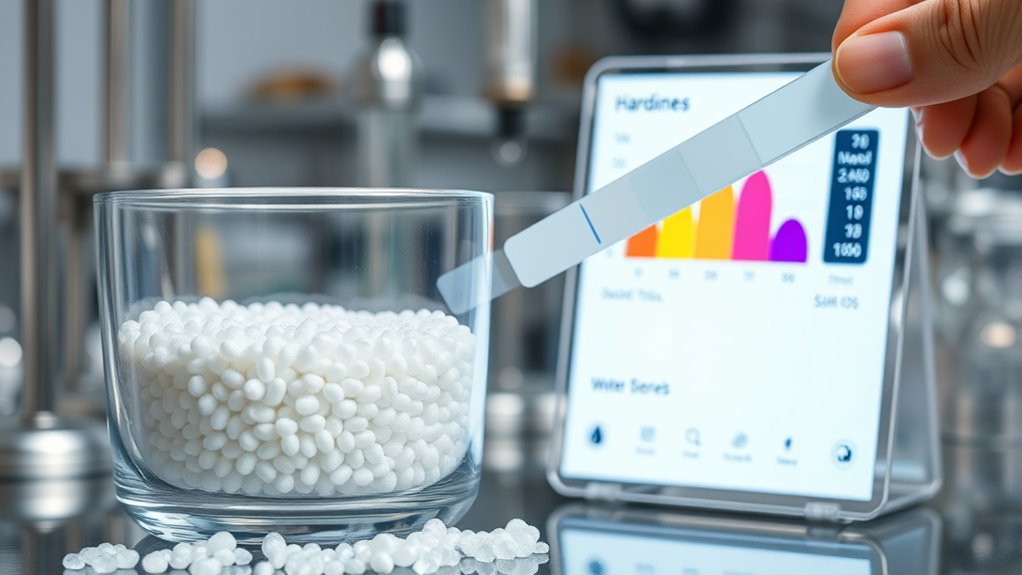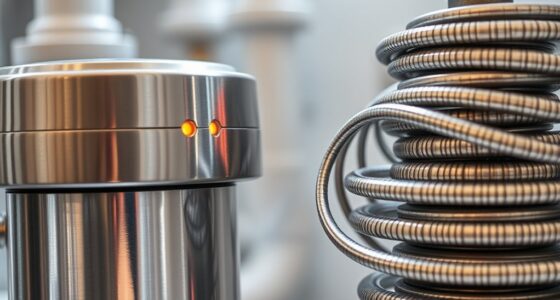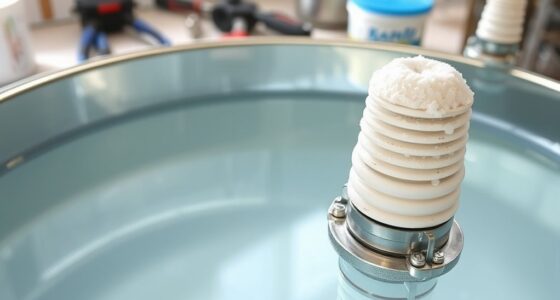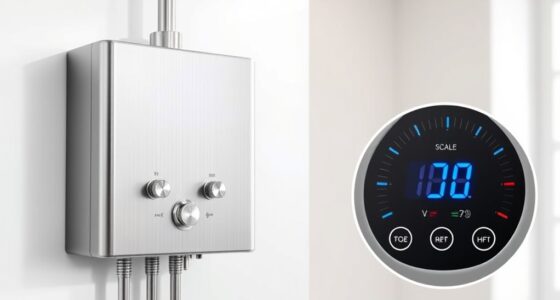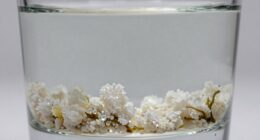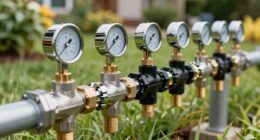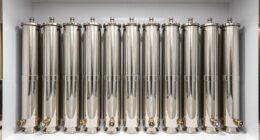Understanding grain capacity and hardness levels helps you choose the right water softener for your home. Grain capacity measures how much hardness the system can handle before regeneration, with higher ratings serving larger families or harder water. Hardness levels indicate the amount of calcium and magnesium in your water and affect how often the softener needs recharging. Learning how these factors work together can improve your softener’s efficiency—keep exploring to get the full picture.
Key Takeaways
- Grain capacity indicates how much hardness a water softener can remove before needing regeneration.
- Hardness levels measure dissolved calcium and magnesium, affecting how frequently the softener must regenerate.
- Higher grain capacity softeners are suitable for very hard water or larger households to reduce regeneration frequency.
- Proper system matching between capacity and water hardness optimizes salt use and prolongs softener lifespan.
- Regular maintenance ensures effective filtration and resin regeneration, maintaining softening efficiency over time.
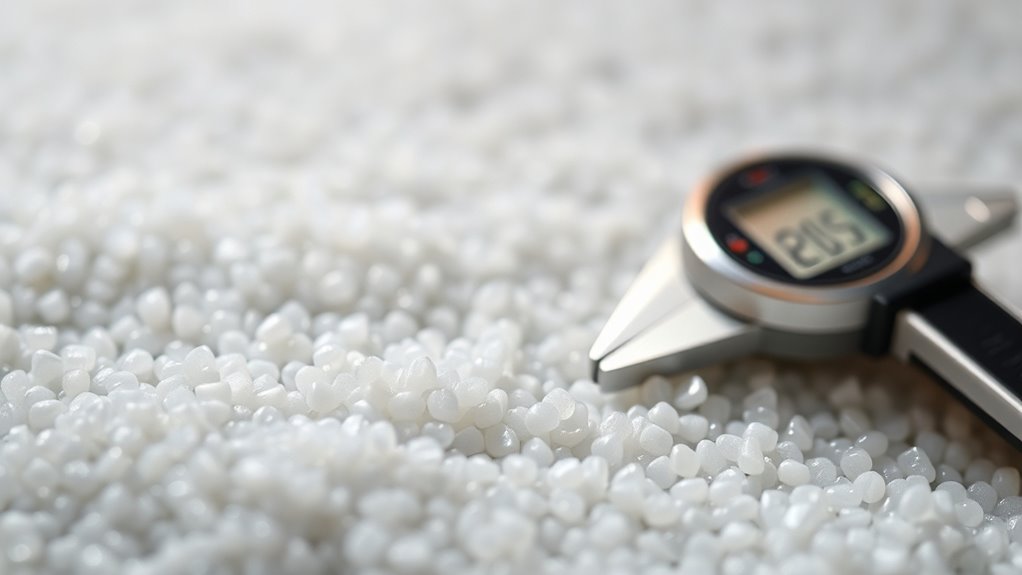
Understanding grain capacity and hardness levels is essential when choosing a water softener, as these factors directly influence its performance and lifespan. When selecting a unit, you need to consider how much water your household uses and the level of hardness in your water supply. Grain capacity refers to the amount of hardness the softener can remove before it requires regeneration, and it’s typically measured in grains. A higher grain capacity means the system can handle more water before needing a recharge, which is especially important if you have a large family or high water consumption.
Hardness levels indicate how much dissolved calcium and magnesium are present in your water. The harder the water, the more frequent the need for regeneration, which involves water filtration and salt regeneration processes. If your water is only mildly hard, a softener with a lower grain capacity might suffice. Conversely, if you’re dealing with very hard water, you’ll want a unit with a higher grain capacity to prevent frequent regenerations, saving you time and salt.
Salt regeneration is a key part of maintaining your water softener’s efficiency. During this process, salt is used to regenerate the resin beads that trap hardness minerals. The frequency of salt regeneration depends heavily on your water hardness level and grain capacity. If your water is particularly hard, you’ll need to add salt more often, ensuring the resin remains effective. Properly managing salt levels is crucial; too little salt can lead to ineffective softening, while too much can cause salt buildup and waste.
Water filtration within the softener system plays a vital role in ensuring your water remains clean and free of impurities. As water passes through the resin bed, hardness minerals are exchanged for sodium ions. When the resin becomes saturated, regeneration restores its capacity, often using a brine solution made from salt. Understanding how your water hardness impacts this process helps you determine how often to perform salt regeneration and when to replace resin beads or upgrade your system.
In essence, grasping the relationship between grain capacity, hardness levels, and the regeneration cycle allows you to optimize your softener’s operation. By selecting a unit with the appropriate capacity for your water hardness, you can minimize the frequency of regeneration, conserve salt, and extend the lifespan of your system. This knowledge ensures you maintain effective water filtration, enjoy softer water, and avoid unnecessary maintenance or costly repairs down the line. Additionally, understanding the impact of water hardness can help you choose the most efficient system tailored to your specific needs.
Frequently Asked Questions
How Does Grain Capacity Affect Long-Term Softener Performance?
Grain capacity directly impacts your softener’s long-term performance by determining how much hardness it can remove before regeneration. A higher grain capacity means your resin lasts longer, reducing frequent regeneration and extending resin lifespan. If your softener has a low grain capacity, you’ll need to regenerate more often, which can shorten the resin lifespan and decrease efficiency over time. Choosing the right grain capacity guarantees ideal performance and durability for your system.
Can Hardness Levels Change Over Time in My Water Supply?
Ironically, your water’s hardness can surprise you, changing over time due to water mineralization shifts. As you rely on softening technology, it’s good to recognize that mineral levels fluctuate from season to season or even with plumbing changes. These variations mean your water hardness can increase or decrease, so it’s wise to periodically test your water to ensure your softener keeps working effectively.
Are There Specific Water Conditions That Require Higher Hardness Levels?
Yes, certain water conditions, like increased mineral content or seasonal changes, can require higher hardness levels for effective softening. If your water quality varies, you might need to adjust your softener settings accordingly. Regular softener adjustments help maintain ideal performance, especially during periods of higher mineral content. Monitoring your water supply ensures your softener works efficiently, preventing buildup and protecting your appliances from scale caused by fluctuating hardness levels.
How Often Should I Test My Water Hardness?
Think of your water as a story that needs regular chapters. You should test your water hardness every 30 days to keep the plot clear. Regular water testing frequency guarantees you catch changes early, so your softener can adapt. Monitoring hardness levels consistently helps prevent buildup and maintains efficiency, much like keeping each chapter in line for a smooth, ongoing narrative. Stay vigilant; your water’s story depends on it.
What Maintenance Is Needed for Optimal Hardness Level Management?
To maintain ideal hardness levels, you should regularly check your water softener, replenish the salt as needed, and perform system cleaning every few months. Keep an eye on salt levels and add more when it’s low to guarantee effective ion exchange. Additionally, clean the resin tank periodically to prevent buildup and keep the system running efficiently, which helps sustain consistent water softness.
Conclusion
By understanding grain capacity and hardness levels, you can choose the right water softener for your needs. For example, if your household has hard water and high iron levels, selecting a unit with higher capacity ensures you won’t run out of soft water during peak usage. Knowing these factors helps you avoid costly repairs and enjoy smoother, better-tasting water. Take the time to evaluate your water, and you’ll make smarter, more efficient choices for your home.
